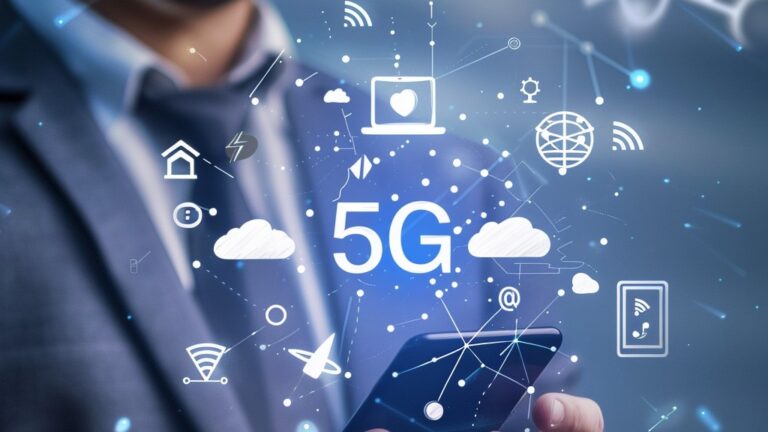The Future of 5G How It Will Impact Business and Everyday Life. The arrival of 5G has been one of the most anticipated technological advancements in recent years, promising to reshape industries, transform how we connect with technology, and redefine our daily lives. The Future of 5G while 4G brought faster internet and improved streaming, 5G is set to take things to an entirely new level with ultra-fast data speeds, near-instantaneous connectivity, and the capacity to support millions of devices simultaneously. But what does this mean for businesses and the average person? Let’s dive into the future of 5G and explore how it’s expected to impact both the professional and personal realms.
1. What Exactly Is 5G?
Before we delve into its implications, let’s take a quick look at what 5G actually means. The term “5G” stands for “fifth generation” of mobile network technology. It’s not just a simple upgrade from 4G but a major leap forward, enabling data to travel at speeds up to 100 times faster than what we’re currently used to. Imagine downloading a full HD movie in seconds or experiencing zero lag while video conferencing. 5G achieves this speed through shorter wavelengths and increased bandwidth, allowing more data to be processed at lightning speed. The Future of 5G.
2. 5G and Business: A New Era of Innovation
The Future of 5G high-speed connectivity is more than just a benefit for everyday users—it’s a game-changer for industries. Here’s how businesses are expected to benefit:
a) Enhanced Remote Work and Collaboration
In a world where remote work has become the new norm, 5G will significantly enhance virtual collaboration. Video calls will be smoother, file sharing will be instantaneous, and lag-free remote work will be achievable even in rural areas with previously weak connections. Imagine a meeting where you can share large files instantly or a real-time collaborative experience that feels like everyone’s in the same room. 5G makes this possible, creating a more connected and productive work environment.
b) Transforming Industry with IoT
The Internet of Things (IoT) has already begun to change how industries operate, with sensors and connected devices playing a major role in sectors like manufacturing, agriculture, and logistics. With 5G, IoT will reach its full potential. Factories can deploy more smart devices to track and optimize production lines in real time. In agriculture, sensors can monitor soil quality, weather conditions, and crop health, sending real-time data to farmers for more efficient decision-making. Logistics companies, on the other hand, can track shipments and manage fleets with pinpoint accuracy, reducing delays and losses.
c) Revolutionizing Healthcare with Telemedicine and Remote Surgery
Healthcare is another industry set to benefit significantly from The Future of 5G. Telemedicine, which allows doctors to consult with patients remotely, will be faster and more efficient with 5G’s low latency and high-quality video streaming. Beyond consultations, 5G could enable remote surgeries, where doctors control robotic arms to perform procedures from miles away. The high-speed connectivity and near-zero lag make this futuristic scenario a real possibility, bringing specialized care to underserved areas.
d) Retail and Customer Experiences
Retailers will be able to create highly interactive shopping experiences, both online and in-store. With augmented reality (AR), customers can try on clothes virtually, test how furniture fits in their living room, or see how a car would look in their driveway—all from their smartphone. 5G also opens up opportunities for personalized shopping experiences and seamless payment options, allowing businesses to engage customers in new and innovative ways.
Table of Contents
3. Everyday Life with 5G: A Glimpse into the Future
So, what does 5G mean for the average person? Here’s how it’s expected to transform day-to-day life:
a) Faster Streaming and Entertainment
5G will make buffering a thing of the past. Streaming 4K or even 8K video will be smooth, with no lag or interruptions. Virtual reality (VR) and augmented reality (AR) experiences will also become more immersive, whether you’re watching a movie, gaming, or exploring a virtual world. Imagine having a movie night with friends who are miles away or playing games that feel like they’re happening in your own living room. With 5G, these experiences will be effortless.
b) Smarter Homes and Cities
5G will fuel the rise of smart homes and smart cities, where devices and infrastructure work seamlessly together to improve quality of life. Your home’s appliances, lights, thermostat, and security system can communicate with each other and respond to your commands instantly. In cities, 5G will enable advancements like real-time traffic management, smart lighting, and waste management, making urban areas more efficient and environmentally friendly.
c) Autonomous Vehicles and Safer Roads
One of the most exciting aspects of 5G is its potential to enable autonomous vehicles. Self-driving cars rely on constant communication with each other and with the road infrastructure around them. With 5G’s high speed and low latency, cars will be able to share data instantly, making split-second decisions to avoid accidents and reduce traffic congestion. Imagine being able to commute hands-free, while your car communicates with other vehicles to choose the fastest route. It’s a future that 5G can make possible.
d) Seamless Connectivity Anywhere
Gone are the days of poor reception in crowded areas or when attending large events. 5G is designed to handle a massive number of devices simultaneously, meaning you’ll get a reliable connection whether you’re in a packed stadium, a subway station, or a remote rural area. This will make staying connected easier than ever, ensuring you have access to information, entertainment, and services whenever and wherever you need them.
4. Potential Challenges of 5G
While 5G brings incredible possibilities, it’s not without its challenges:
- Infrastructure Costs: Rolling out 5G infrastructure is expensive, requiring new cell towers and equipment. This could mean higher costs for consumers initially.
- Privacy and Security: With more devices connected, there’s a greater need for strong cybersecurity measures. Businesses and individuals alike will need to prioritize security to protect sensitive information.
- Health Concerns and Environmental Impact: Some people have raised concerns about the health effects of 5G radiation, although studies haven’t shown conclusive evidence of harm. Additionally, with more devices connected, energy consumption could increase, raising questions about environmental impact.
5. The Road Ahead: What to Expect in the Future of 5G
As 5G continues to roll out, we’ll likely see even more applications and innovations. The technology is still in its early stages, meaning we’ve only scratched the surface of what’s possible. Here’s what the future could hold:
- 6G Development: Believe it or not, researchers are already working on 6G technology, which could be ready by the 2030s and promises speeds up to 100 times faster than 5G.
- Expanded Coverage: Over the next few years, 5G networks will expand, bringing high-speed connectivity to more rural and remote areas, closing the digital divide.
- New Business Models: The capabilities of 5G will enable entirely new business models in areas like virtual reality, telemedicine, and IoT, opening up new revenue streams and opportunities for innovation.
The Future of 5G
The future of 5G is bright, with endless possibilities that promise to reshape business operations and improve daily life. As we move forward, this revolutionary technology will likely continue to break down barriers, connect communities, and push the boundaries of what’s possible. The question is no longer if 5G will impact us—it’s how much of an impact it will have and how quickly it will transform our world.


